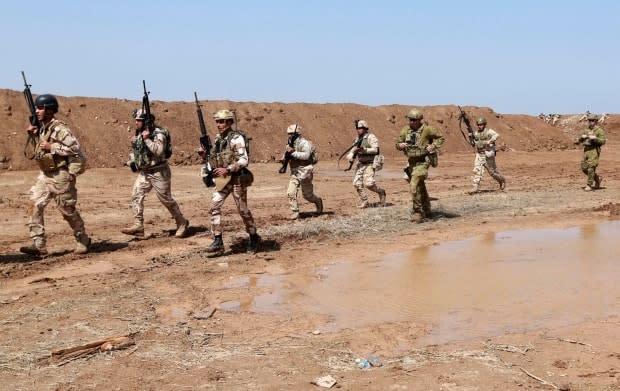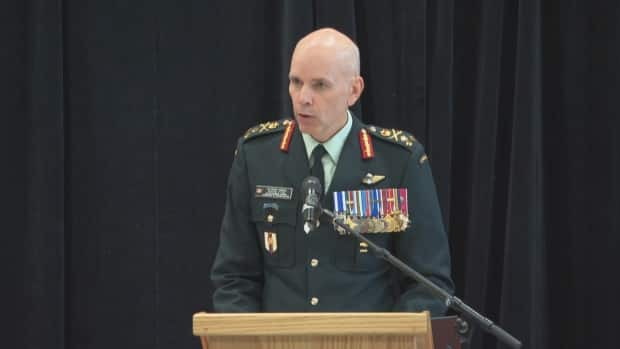Canadian trainers being questioned by military police about witnessing possible Iraqi war crimes

Canadian soldiers who saw videos depicting possible war crimes by Iraqi security forces are now being interviewed by military police investigators, CBC News has learned.
The country's acting top military commander said he wants to find out precisely what happened almost three years ago during a military training mission in the northern part of the war-torn country before deciding what comes next.
"When I heard the allegations of this, it gravely concerned me," Lt.-Gen. Wayne Eyre told CBC's chief political correspondent Rosemary Barton in an interview being broadcast today. "I've ordered an investigation into it to determine the facts."
Sources with knowledge of the case tell CBC News that some of the Canadian soldiers who were training Iraqi police in the finer points of counter-terrorism operations, including the laws of armed conflict, were interviewed by military police investigators last week.

Last month, Postmedia reported that, within days of their arrival at a U.S.-led training base near Mosul, the Canadian soldiers were shown videos of possible war crimes shot by their students.
The videos allegedly showed Iraqi security forces raping a woman to death, along with multiple gruesome examples of the torture and execution of Islamic State prisoners.
The trainers — who reportedly feared they were instructing war criminals — informed the Canadian contingent commander, who told them not to look at any further videos and promised to raise it with the chain of command.
It's not clear if the Canadians on the ground took up the issue with the U.S. commander of the base. How much the Canadian military and civilian leadership in Ottawa knew is also a matter for debate. Some confidential sources have suggested that only a brief mention of the trainers' concerns was made in a single after-action report.
'I am an ethical man'
The matter might have been buried and forgotten had it not been for a briefing note prepared recently for the new commander of the 3rd Battalion Royal Canadian Regiment, based in Petawawa, Ont.
In that note, a soldier who said he'd tried three times to bring official attention to the matter wrote that soldiers were traumatized by the experience.
"I am an ethical man and I believe in our moral doctrine and the [Law of Armed Conflict]," the unidentified soldier wrote in the briefing note. A copy of the note was obtained by CBC News.
"I have thought about the incident every day since the event took place. I am bothered by the fact that my assigned duties allowed me to train and enable people who in my mind were criminals."
The soldier, an Afghan combat veteran, said he'd never witnessed anything like what he saw in the Iraqi videos.
"Among all of my experiences, none other has negatively affected my mental well-being as much as this particular incident," the briefing note said.
Laws of warfare
Failure to report a possible war crime is a violation of international law. There are also domestic implications, even for troops deployed overseas.
Under Canada's Criminal Code, a military commander can be charged for failing "to take, as soon as practicable, all necessary and reasonable measures within their power" to report such an incident "to the competent authorities for investigation and prosecution."
Stuart Hendin, a lawyer and expert who has instructed United Nations peacekeepers in the law of armed conflict, said he was shocked the Canadian troops in Iraq were told to simply look away from the videos.
The message to the troops, he said, was "what you don't know won't hurt you. In other words, ignorance is bliss, and if that's the type of attitude this officer has, then with the greatest of respect, he shouldn't wear the uniform."
Hendin said that if the matter was reported up the Canadian chain of command, there was a duty to report what had been seen to the Office of the High Commissioner for Human Rights at the United Nations. It would be up to that agency to determine whether a war crime had been committed.
"Given what's contained in the videos, there was — at the very, very least — human rights abuses, if not far more," he said.
Asked recently by the Opposition Conservatives about the Iraq reports, the Liberal parliamentary secretary for defence, Anita Vandenbeld, told the House of Commons that military police were trying to figure out whether they had jurisdiction to investigate the case, given the possible evidence of war crimes.
Eyre told Barton that investigators need to determine "the facts first before we expand the scope of the investigation."
The training of Iraqi police took place in the months after the city of Mosul was liberated in late 2016 after two years of brutal rule by Islamic State extremists.

Canadian special forces troops advised and even helped to defend some Kurdish soldiers who fought block by block through the ruined city to recapture it.
Battling alongside the Kurds were Iraqis security forces. They included Shia militia, some of whom were accused by human right groups of committing atrocities.
In standing up the military training mission, the former NATO commander in Iraq, Maj.-Gen. Dany Fortin, insisted in several media interviews that the screening of police recruits was robust and would catch possible war criminals.
Eyre said one of his major concerns is the possibility that Canadian soldiers, serving in some of the bloodiest corners of the world, end up simply accepting brutality as normal.
"We've got to make sure that we have the reporting mechanisms in place to protect our soldiers from those types of activities," he said.

